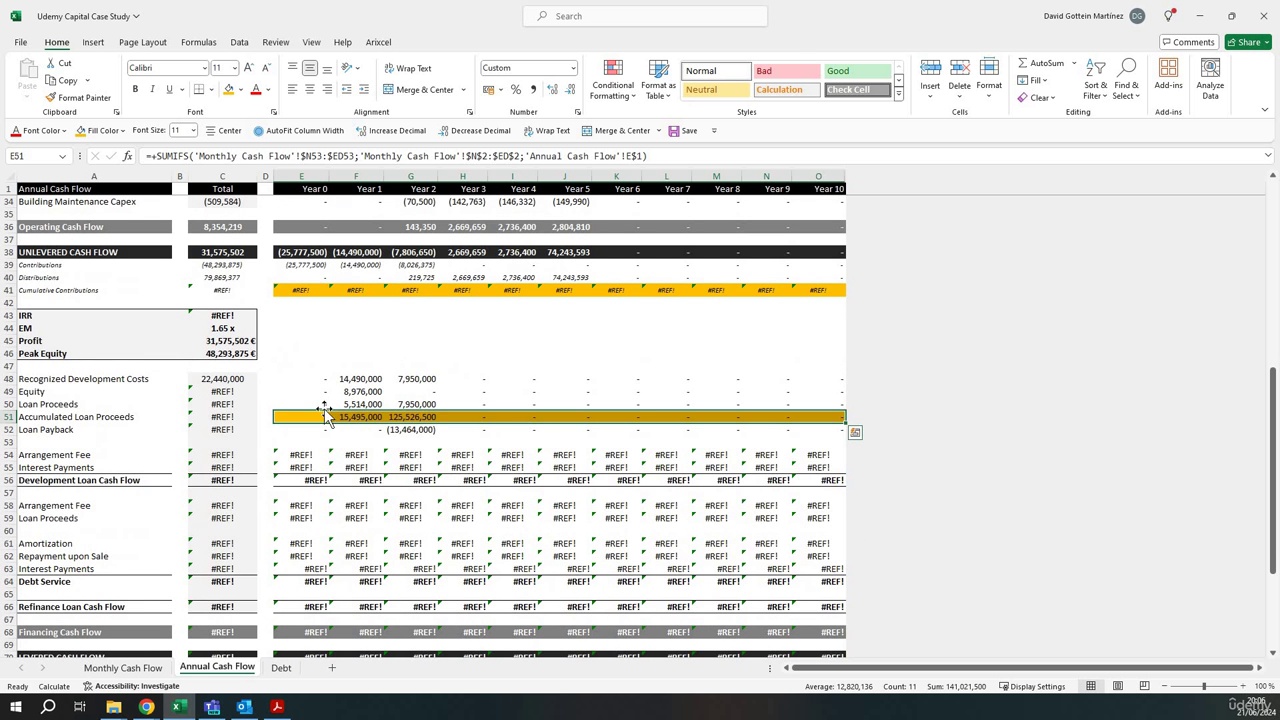About Real Estate InvestingLearn More
Real estate investment is buying and selling property to increase wealth. Real estate is one of the most stable assets anyone can invest in because it rarely decreases in value. Udemy real estate investment classes can teach you how to analyze return potential for prospective purchases, improve your understanding of real estate markets, and much more.
Sort by:
Sorting
The newest
Most visited
Course time
Subtitle
Filtering
Courses

Udemy


Ibrahim Benabderrazik
Real Estate Financial Modeling - Create a Basic Model Fast 2:39:03
06/01/2024
Subtitle

Udemy


Justin Kivel
The Real Estate Equity Waterfall Modeling Master Class 3:45:09
English subtitles
05/19/2024
Subtitle

Udemy


Peggy Yee
Real Estate Math Made Easy: Pass Your Licensing Exam 1:55:57
English subtitles
12/14/2023
Frequently asked questions about Real Estate Investing
Real estate is both a term and an industry. The formal definition of the words “real estate” is “property consisting of land or buildings.” The term also refers to the entire industry that deals with the buying and selling of properties. There are several types of professionals who work in real estate. Real estate agents broker homes for buyers and sellers. Landlords buy houses or buildings and rent them to tenants — they might also buy commercial property and rent retail or office space to business owners. There are also subcategories of the real estate industry. Appraisers evaluate properties for buyers, sellers, and banks. Building managers handle rental units and maintain buildings for owners.
People buy land to sell to others or develop by building homes, office buildings, or other structures. Some will keep the property with the structure for business or personal use, while others will sell it once they finish construction. The five major types of real estate include land, residential, commercial, industrial, and mixed-use. Residential real estate typically means 1-4 unit dwelling structures, but some also refer to huge multi-family buildings as residential. Commercial includes office buildings, stores, hotels, or any structure used for business purposes. Industrial real estate generally refers to manufacturing, warehousing, and research facilities. Mixed-use is when a property combines two of the real estate types. For example, a warehouse with a storefront is a mix of commercial and industrial. Some consider special use properties as a sixth type of real estate. Special use consists of atypical land or structures, such as government buildings, parks, or cemeteries.
The economic characteristics of real estate include location, improvements, usefulness, scarcity, and demand. A property’s location plays a vital role in its value. Houses in a quiet neighborhood are typically worth more than a home close to a freeway. Improvements are anything added to a piece of land, including utilities and structures. The nature of the improvements and their condition will help determine its value. The more useful a property is, the more it’s worth. For example, a restaurant that seats 50 patrons has more value than one that only seats 15. When land or homes are scarce in a particular area, they will fetch a higher price because buyers don’t have that many options. If there is plenty of supply, sellers might have to lower their expectations. The same is true with demand. Homes in desirable areas are often more expensive because many potential buyers want the property. In towns where business owners need storage, warehousing space might be costly.
Real estate investing is the purchase of a property with the goal of generating income instead of using that property as a personal residence. Unlike investing in equity or stocks, investing in real estate is thought to be a safer option because property values tend to rise in the long run. Properties like houses, retail spaces, agricultural land, and industrial buildings are all good possibilities for real estate investment; any property that is immovable and yet still transferable is viable for investment. In residential properties, you can do this by buying a home with the intention of renting or selling it for a larger profit. A perfect example of profiting from real estate investment is the process of renting out an apartment building or home, which can provide an ongoing source of income.
There are known strategies that make it easier to get started in real estate investing. One possible way of investing in real estate, especially in residential buildings, is to become a landlord and rent out a designated space that you own to your tenants. This method can provide you with regular income. On the other hand, you could also look into fixing and flipping houses to sell, which is the process of buying a residential property, repairing and decorating it to appeal to possible clientele, and then selling it afterward. Of course, these are only two of many ways that investing in real estate could become a profitable business endeavor.
A few skills needed for this line of work are the ability to detail plans, follow through with them, research real estate markets, evaluate risks involved in an investment, and general accounting skills. Making plans that you can complete is helpful in the long term, especially when it comes to investing and managing multiple properties. Researching different markets and knowing where to look for more information on your investment is also something that will prove to be useful. Looking at the investment from different perspectives and using that information to make decisions can help you better evaluate your choices. Like many other types of investments, skills that come with accounting and managing money in different places are indispensable in the long term.


























